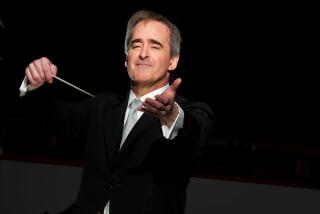OPERA QUIZMASTER, 74, STILL HAS SOME ANSWERS
- Share via
The voice--civilized, well-modulated, reassuring and still tinged with an accent revealing its Boston origins--is familiar, very familiar. But the face is not.
Edward Downes, after 27 seasons still quizmaster of the Saturday morning Texaco/Metropolitan Opera radio intermissions, says his enthusiasm for the quiz, as for the opera itself, is undiminished. The spring in his step, as well as the brightness in his voice, attest his sincerity.
At 74, the genial radio personality, an author, musicologist and professor of music, stays busy, he said Thursday.
A longtime New Yorker, Downes is in Los Angeles this weekend, for instance, to speak to the Opera Guild of Southern California at the UCLA Faculty Center, this afternoon at two o’clock (information: (213) 471-7597).
And, though he retired four years ago from a long-term post at Queens College in Flushing, N.Y., Downes still teaches one course at New York University.
“It’s a two-year program for composers, stage directors and authors--people who want to write a Broadway musical,” Downes describes the course.
“You know, the people whose role model is Stephen Sondheim. It’s great fun for me, and allows me to keep an irregular schedule. My function is to guide the students, each of whom is working on an individual project.”
“I help them steal from Mozart or Puccini--not tunes, of course, but procedures, ways of solving problems.”
Himself the son of a musical journalist--the late Olin Downes, chief music critic of the New York Times from 1924 to his death in 1955--Edward Downes has been a critic, program annotator and lecturer on musical subjects for more than 50 years. Yet no sign of burnout furrows his brow.
“Oh, no, I’m very optimistic about the future of opera in this country, and not at all disenchanted with the present situation,” he says in response to a direct question about American operatic life.
“While it is true that, at the moment, we may lack the thrilling individual voices of former times, we still have going a very high standard of operatic production and vocalism.”
Downes remembers “much lower” standards of scenic production, and of operatic choral singing and orchestral playing, “when I started going to the opera, in the 1920s.”
In those days, Downes says, “Though we had some great singers in leading roles, the orchestras in the pit were awful. “ Nor were choral or scenic values on a higher level, he recalls.
“In the Wagner operas given at the Met (in the first half of this century), the choruses were quite terrible. And the principal singers, for the most part, were nothing special, either. In the days before (Lauritz) Melchior (who made his Met debut in 1926), there was only one male singer who could actually get through those tenor roles. But the sound he made was horrendous. “
Downes admits, “We have today a shortage of Aidas, certainly no one who can be compared to (Rosa) Ponselle. But that can change at any time.
“The problem is not a lack of good teachers in this country. If anyone, it is the Italians who have been dropping off in the area of teaching. They are not producing the voices we have always expected, even taken for granted, from their country.”
One Italian impresario, Downes relates, by way of example, “Called me to tell me about two young tenors he had found. But, he said, he could not think of any studio or school in all of Italy where he could take them for training. He ended up calling me and asking how to get them into Juilliard!”
The operatic life, even for one in his eighth decade, Downes says, is “exhilarating.” The talk he is scheduled to give this afternoon indicates only a part of the range of his interests. Titled “Behind the Air Waves at the Met Intermission,” it will also include taped excerpts from the “more than one hour” tape Downes made with the late Maria Callas, in the early 1960s.
The white-haired operatic broadcaster recalls, “I had lunch with her, the day before the tapes were made, and, I must say, that conversation was almost more interesting--for its content. For the tape, Madame Callas was, really, well, performing. . . . “
More to Read
The biggest entertainment stories
Get our big stories about Hollywood, film, television, music, arts, culture and more right in your inbox as soon as they publish.
You may occasionally receive promotional content from the Los Angeles Times.










